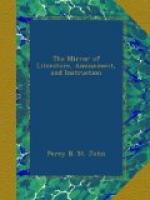“The best houses are all facing the sea, and chiefly to the north of the sea gate. The British factory is a large and lofty building, but has most of the inconveniences of an Arab house.
“The town of Mocha is surrounded by a wall, which towards the sea is not above sixteen feet high, though on the land side it may, in some places, be thirty. In every part it is too thin to resist a cannon-ball, and the batteries along shore are unable to bear the shock of firing the cannon that are upon them.
“The climate of Mocha is extremely sultry,[2] owing to its vicinity to the arid sands of Africa, over which the S.E. wind blows for so long a continuance, as not to be cooled in its short passage over the sea below the Straits Babel Mandel.
[2] From 90 to 95 deg. Fahr in July.
“Mocha, according to some learned natives, was not in existence four hundred years ago; from which period we know nothing of it, till the discoveries and conquests of the Portuguese in India opened the Red Sea to the natives of Europe.”
Mrs. Lushington, in her interesting Journey from Calcutta to Europe, says, “the coffee-bean is cultivated in the interior, and is thence brought to Mocha for exportation. The Arabs themselves use the husks, which make but an inferior infusion. Every lady who pays a visit, carries a small bag of coffee with her, which enables her ’to enjoy society without putting her friends to expense.’”
Mocha coffee is in smaller berries than other kinds, and its flavour is extremely fine. Hundreds of pages have been written on the origin and introduction of coffee as a beverage. In the Coffee-drinker’s Manual, translated from the French, we find it dated at the middle of the seventeenth century, and in that quarter of Arabia wherein Mocha is situated.
* * * * *
ORIGIN OF THE HOUSE OF COMMONS.
(To the Editor.)
As a general reader of your entertaining miscellany, I take the liberty to correct a mistake in No. 481, relative to the Origin of the House of Commons, which is indirectly stated to have originated from the Battle of Evesham. It is true that the earliest instance on record of the assembling in parliament representatives of the people occurred in the same year with the battle of Evesham; but it had no connexion whatever with the event of that engagement, since the parliament (to which for the first time citizens and burgesses were summoned) was assembled through the influence of the Earl of Leicester, who then held the king under his control; and the meeting took place in the beginning of the year 1265, the writs of summons having been issued in November, 1264; while the battle of Evesham, in which the Earl of Leicester was killed, did not happen till August 4, 1265, or between five and six months after the conclusion of the parliament. From that period to the death of Henry III. in 1272, it does not appear that any election of citizens or burgesses, to attend parliament, occurred. The next instance of such elections seems to have happened in the 18th of Edward I.; and the first returns to such writs of summons extant are dated the 23rd of the same reign, since which, with a few intermissions, they have been regularly continued.




